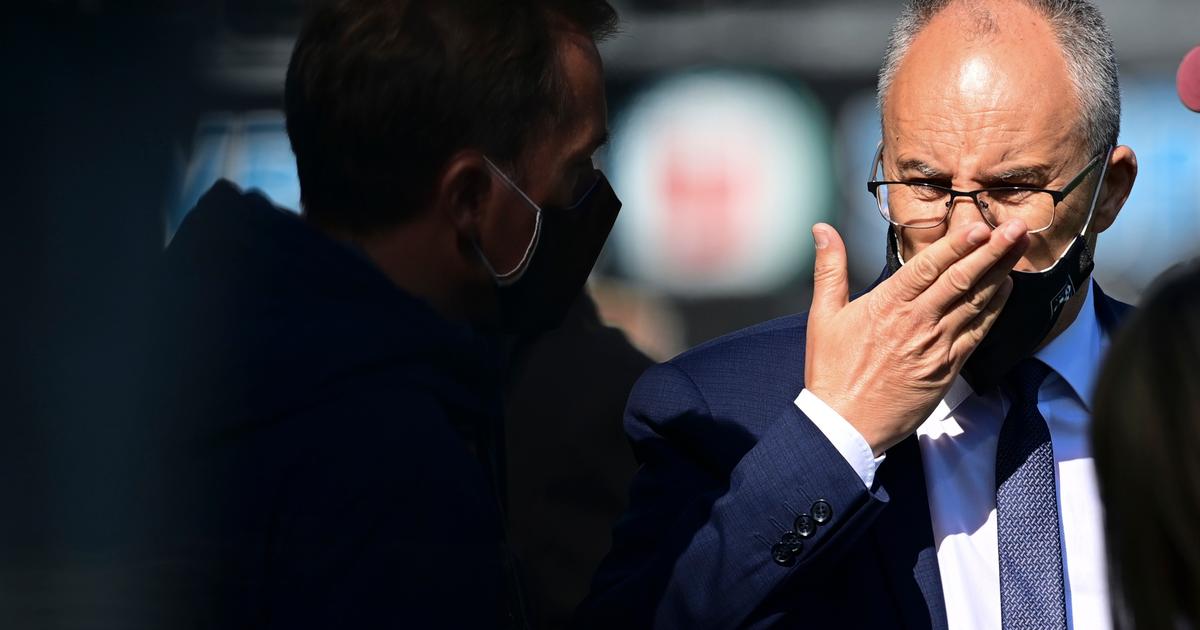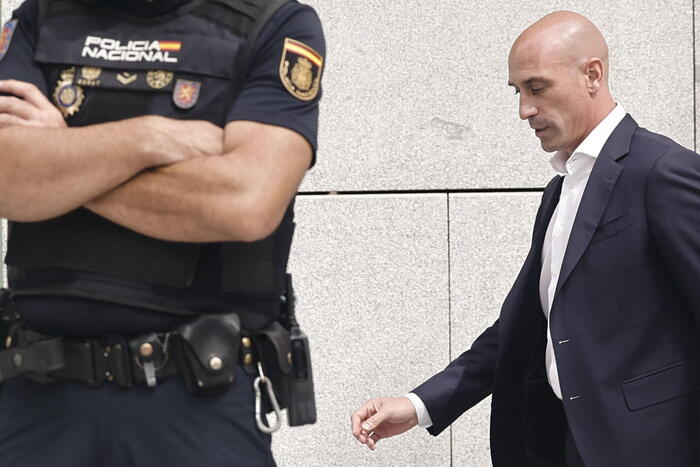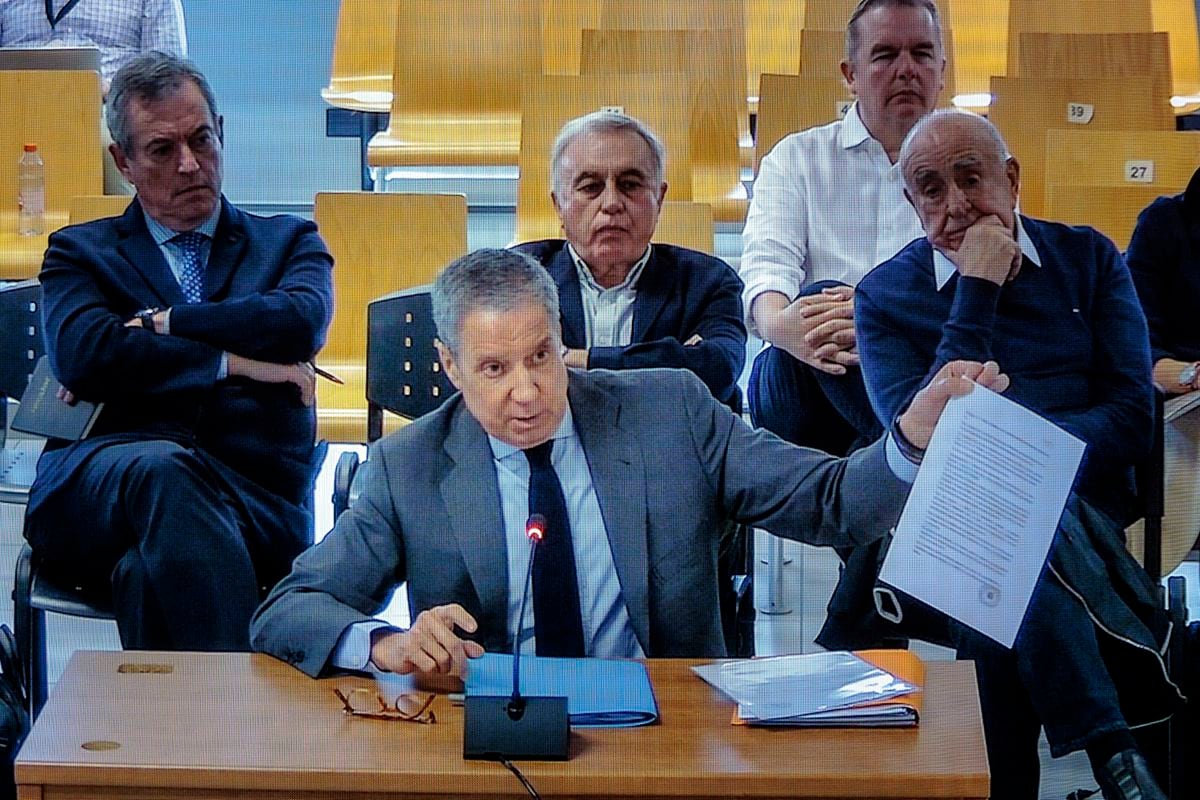How Orban friends benefit from sport: "Football is money laundering here"
Created: 04/03/2022 14:29
By: Andreas Schmid
Viktor Orban invests heavily in Hungarian football.
On the one hand he wants to bring the national team back to its former glory, on the other hand he and his confidants will benefit.
© dpa/Robert Michael/Tobias Hase/Montage
Why does Hungary invest so enormously in sport, including foreign ones?
"In the end, Fidesz grandees and Orban loyalists will benefit," say critics.
Budapest - If you drive through Hungary, you will often see them: state-of-the-art football stadiums.
Expensive arenas with often more empty than full seats.
Eleven of the twelve Hungarian first division clubs have gotten a new or renovated stadium in the last ten years.
Also thanks to Viktor Orban*.
Hungary's sports policy: "We want to prove to the world that we are still someone"
Since Orban's re-election as prime minister in 2010, more and more money has been flowing into sport, especially football.
Hungary's government invests more money in sports than in education policy.
Since 2010 it should be more than two billion euros.
Budapest's Puskas Arena alone, Hungary's new national stadium, cost almost 600 million euros.
Where there is a lot of money, the accusation of enrichment quickly becomes loud.
At least there are questions like: Why is Hungary pumping so much money into football when its own league is down to serial champions Ferencvaros
Budapest seems rather unattractive?
Officially, Hungary's football should be restored to its former glory.
The team of the century from 1954, which is revered in Hungary and lost the World Cup final against the Federal Republic of Germany in Bern, serves as a model.
The Magyars are a long way from such glorious times.
However, minor successes such as qualifying for the European Championships are often attributed to one's own efforts.
World class thanks to Orban?
"We have set ourselves the goal of proving to ourselves and the world that we are still someone," says the prime minister, who likes to describe himself as a football-mad fan.
In fact, he often goes to the stadium for games, including abroad.
He used to kick as a striker.
"Hungary not only produced outstanding footballers, but also a long and successful football tradition, especially through the 1950s and 1960s," says Philipp Hartewig, sports policy spokesman for the FDP parliamentary group.
"Investments in sport are not reprehensible, but the question and danger of sportswashing always arises." Sportswashing is the goal of improving one's own reputation by organizing sports events.
Hungary's golden eleven, far left national hero Ferenc Puskas.
From 1950 to 1954, the national team went unbeaten in 31 official international matches in a row until they lost 3-2 to West Germany in the World Cup final.
© Imago sports photo service
Hungary's sports policy: Fidesz connections to the premier league
But is Hungarian football really benefiting from the investments?
Or are they just an excuse for other things in the background?
The fact is: Hungary's mass sport doesn't hurt better football pitches - even if the investments are usually limited to the big clubs.
The national team can also benefit from better sporting conditions, at least in theory.
Orban's story of the kind sponsor for what is after all the most popular sport in the country is by no means finished.
Orban has managed to install a confidante in almost every Hungarian professional club.
"All Hungarian clubs have ties to Orban's Fidesz party," says a Hungarian sports journalist.
Orban's former development minister, Miklos Sesztak, would be in charge of current second-placed Kisvarda.
Sesztak does not have an official position.
When asked, he declined to comment, nor did Orban's government.
More obvious is the Orban connection in Felcsut.
Orban grew up in the almost 2,000-inhabitant community 45 kilometers from Budapest.
In 2005 he founded the Puskas Akademika association - and since then has continuously staffed it with confidants.
Orban was initially president himself, now it is his childhood friend Lorinc Meszaros.
A 56-year-old businessman with an impressive CV.
Within a few years, it went from a simple gas fitter to Hungary's richest man.
Meszaros alongside Orban at the stadium.
How did he get so rich?
He himself says: "Through God, luck and certainly Viktor Orban." © Szilard Vörös/estost.net/Imago
Hungary election: "This is electoral fraud" - Orban also relies on voters living abroad
Moreover, Orban makes no secret of the fact that he would like to return to Greater Hungarian strength as in the Kingdom of Hungary.
That is why he has a special eye for Hungarians living abroad.
They, too, are entitled to vote in the April 3 election.
It seems that Orban wants to be confirmed in office with their support.
The Greens politician Anton Hofreiter criticizes how the government is doing this.
“Hungarian minorities can register to vote with a place of residence.
Then suddenly several hundred people live at one address.” Hungary had “very generously” issued passports to Hungarian-speaking minorities.
In tight constituencies, these people could make for “very distorted results.”
An absurdity for the former Greens parliamentary group leader: “People who are assumed to vote for you are moved back and forth in the constituencies.
This is voter fraud.”
The former leader of the Greens parliamentary group, Anton Hofreiter, was there a week before the Hungarian elections together with the Greens European politician Daniel Freund to get an idea of the election campaign.
The two politicians describe their impressions to Merkur.de.
© Istvan Bielik/fkn
Hungary's sports policy: Romania, Serbia, Slovenia - Orban's investments in "Greater Hungary"
In fact, the Fidesz party is also very present away from the election campaign in those regions where many Hungarians live.
The government is to invest around 70 million euros in foreign sports, probably to “unite the nation”, as Orban once said.
This can be seen, for example, in the Transylvania region in Romania.
The Hungarian government is investing in two professional clubs there.
Sepsi Sfantu Gheorghe and FK Miercurea Ciuc.
Sepsi, a club from Sankt Georgen, where the population is 70 percent Hungarian, qualified for a European competition, the newly created Uefa Conference League, for the first time last year.
In the Croatian Osijek, Orban friend Meszaros meanwhile had shares in the first division club NK Osijek.
Meszaros also wanted to invest in SV Mattersburg in Austria, but a deal never materialized.
There are also Fidesz connections to Nafta in Slovenia or Dunajska Streda in Slovakia, where 75 percent of the residents describe themselves as Hungarians.
FC DAC is now a top club thanks to a new stadium, six Hungarians play in the team.
In Serbia, Orban established a football academy for TSC Backa Topola.
According to figures from 2011, almost 60 percent of the people in the city of around 30,000 are Hungarians.
Within a few years, Backa Topola went from the fourth division to qualifying for the Europa League, and the former provincial club is currently fifth.
Viktor Orban at the opening of the football academy in Backa Topola, Serbia, in 2018.
The city is located in the province of Vojvodina, which used to be part of Greater Hungary.
© Marko Metlas/Imago
Hungary's sports policy: "In the end, Fidesz greats and Orban loyalists will benefit"
Merkur.de
wants to know from the government
who will benefit from the investments .
No Answer.
Peter Marki-Zay, Orban's opponent in the election on April 3, responds, albeit in campaign mode: "Orban benefits.
You don't even need to look for other profiteers.
Nothing works in Hungary without Orban.” According to Marki-Zay, national pride also plays a role in the investments.
A good national team brings people together.
You could see that at last year's European Championship, when fans of all Hungarian first division teams united behind the national team.
Unlike in Germany, for example, the national team in Hungary enjoys significantly more recognition than, for example, club football.
Marki-Zay says of Meszaros: "He has become rich through Orban and is anything but independent." Orban's opponent resonates with allegations of personal enrichment.
Because Orban is not allowed to own private companies due to his position as prime minister, he would take the detour via Meszaros.
“Meszaros is nothing more than Orban's wallet.
His wealth is also Orban's wealth, there's no doubt about that."
Orban's challenger in the April 3 prime ministerial election: Peter Marki-Zay.
© Peter Kohalmi/AFP
Hungary's sports policy: hand in hand with Uefa
The SPD politician Sabine Poschmann also sees “numerous indications of nepotism and distortion of competition”.
Orban's policy is "characterized by a concentration of power at all levels, combined with the erosion of fundamental democratic principles," says the sports policy spokeswoman for the SPD parliamentary group on
Merkur.de
.
Sabine Poschmann has been a member of the German Bundestag since 2013.
She is a member of the extended SPD parliamentary group executive committee and has been sports policy spokesman for her parliamentary group since December.
© Political Moments/Imago
Orban uses sport and football in particular "for propaganda purposes, to strengthen national pride and Hungarian identity".
That is why Hungary would always host major sporting events such as the European Handball Championship or various international games.
"Orban obviously wants to position Hungary as an attractive location for major sporting events." Budapest has already been awarded the final of the Europa League 2023.
Several Champions League games were moved to Budapest, for example to avoid travel restrictions for the teams or to be able to play in front of fans, like FC Bayern against FC Sevilla in the Supercup.
Uefa is not averse to this.
With Budapest stepping in, the tightly scheduled game calendar was also able to be adhered to and, of course, more income was generated as a result.
Hungary's sports policy: "The Orban system is quite unique"
In Hungary, politics and sport are generally closely intertwined.
Too tight?
The Greens European politician Daniel Freund speaks to
Merkur.de
of corruption: “Like many public areas in Hungary, sport is also characterized by corrupt machinations.
Public money is pumped into football teams without being justified by any sporting successes.
In the end, Fidesz grandees and those loyal to Orban will benefit.” Specifically: “Those who have become millionaires and billionaires with public contracts.” For example, through expensive stadium construction projects.
Today's member of the Bundestag and former EU member, Inge Grässle, sees it similarly.
As the EU budget controller, the CDU politician "was committed to European funds, but the
Orban system
is quite unique," she says to
Merkur.de
.
"It's not necessarily based on personal enrichment - apart from the son-in-law - but on the mixing of politics and business." Orban's son-in-law Istvan Tiborcz is involved in many deals with Orban's buddy Meszaros.
There are also reports that Orban's father Gyözö's family business will be involved in the business.
Freund also speaks of a "sophisticated system" that Orban created in sport.
“It serves a single purpose: to let public funds find their way into the pockets of those who support them politically.” In professional football in Hungary, the following applies: “In the end, those who are close to the politically powerful will be successful.
Football is not only about prestige here.
Football is money laundering here.”
(as) *Merkur.de is an offer from IPPEN.MEDIA
Hungary Election 2022
This text is part of our coverage of the Hungarian elections on April 3rd.
A text about Puskas Akademia, a football club in Viktor Orban's hometown, has already been published.
An interview with Peter Marki-Zay, Orban's challenger, follows on Saturday.








